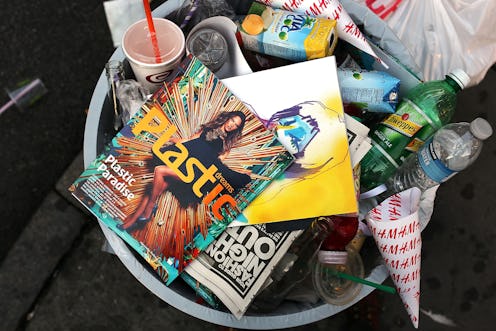Life

The whole thing with garbage is that we keep it out of sight, out of mind — we don't think about it in the specific or the abstract, and we definitely don't think about how much we're producing on the daily. But of course, with climate change an ever-present threat, and that island of trash growing ever larger by the day, there's no time like now to think about ways to reduce waste — because reusing and recycling can only go so far.
One of the best ways to lessen and reduce our individual — and collective — environmental impact is to think about how we use and dispose of products every day; what we consume, and how we get rid of our stuff when we're done. According to the United States Environmental Protection Agency (EPA), there’s a lot you can do to have a positive impact on our environment every day. The daily choices we all make add up; both as individual consumers, and local and global communities. You may be tempted to think that your individual contribution can’t make a dent in the environment issues we face, but a few small, daily habits can make a big difference, so check out these seven simple and powerful, steps you can take to reduce your waste in honor all year round.
1
Invest In Reusable Food Storage Containers
One of the best ways to reduce your waste is to opt out of using single-use plastics, and switch to reusable options. Mason jars, and reusable glass food storage containers, are an inexpensive investment up front, and will save you money in the long run. This will save on waste by not buying more plastic, but also keeping your food fresher for longer.
2
Rethink Disposable Items
Switch out your disposable stuff wherever possible — swap paper towels for washable cloth towels and rags, and skip the plastic cutlery, plates, sandwich bags, and plastic wrap. There are lots of great alternatives — like reusable lunch boxes, water bottles, and drinking straws, that don't put as much of a dent in the environment.
3
Avoid Plastic Bags
Invest in some reusable shopping totes, and skip the plastic bags at the grocery checkout. According to the official Earth Day website, "about 300 million tons of plastic are produced each year to make bags, bottles, packages, and other commodities [...] only about ten percent of this plastic is properly recycled and reused. The rest ends up as waste in our landfills, or as litter in our natural environment." This is very easily remedied by saving the free tote bags you get at that annual conference, or by investing $2.00 the next time you stop at Trader Joe's.
4
Do A 30-Day Spending Fast
A 30-day spending fast can help you get a read on where you might be consuming the most — and maybe spending too much, too. Examining and revising your spending plan can help you reduce the amount of stuff you buy, and also get a handle on how much you're throwing out.
5
Go Digital
Signing up for paperless billing is an easy way to reduce the amount of paper you get that's just going to be recycled, anyway — and it saves your utility companies and banks money, too. While you're at it, if it makes sense for your financial situation, go ahead and set up auto-pay for your bills, too — that way, you won't need the reminder at all.
And while this isn't the most ~fun~ way to spend a Saturday afternoon, you know what's also a significant source of paper you don't need in your life? Junk mail. Instead of tossing those gym membership offers directly into the recycling bin, save what you get every month and take the time to unsubscribe (there's usually a customer service phone number that will help you with this). Think of it as spring cleaning.
6
Donate Old Clothes
If you make a point to clean out your closet about once a year or so, consider upcycling the items you're not using anymore. Instead of throwing out old clothes, donate them to your favorite charity organization — some places will even come pick up your donations for you — or resell them. However, it's worth noting that the fashion industry is one of the largest sources of waste on the planet, so if you can avoid buying clothes you're not going to wear in the first place, that's probably the easiest way to cut down on waste.
7
Check Out Freecycle And Buy Nothing
Freecycle is a nonprofit group helping to keep anything and everything possible — that's still usable and in good shape — out of landfills. You can browse groups by state, and find anything from books and furniture, to baby clothes, collectibles, and kids toys for free. And you can donate items, too. Buy Nothing is another great option, and operates under a similar concept; you can find groups in 20 countries, and each group creates a gift economy, where folks can give stuff away, or find stuff they need for free.
Committing to reducing our individual environmental impact doesn't have to be hard or super complicated; just pick a few new habits to start with — like ditching single use plastics, and recycling what you can — and take it from there.